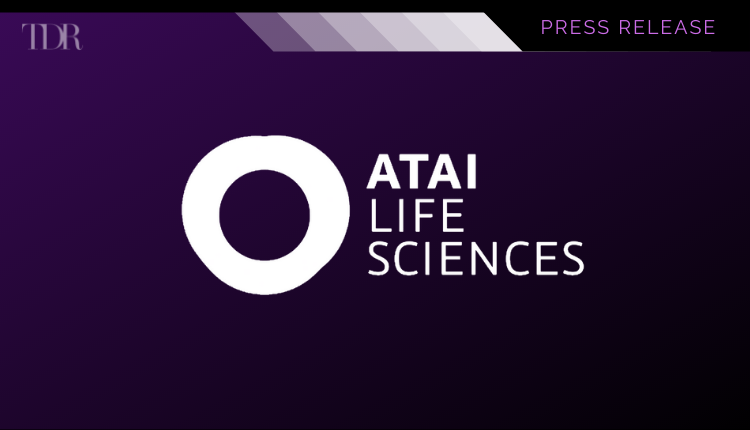
atai Life Sciences announces FDA Investigational New Drug (IND) Clearance for PCN-101 R-ketamine Program
• Enables expansion of PCN-101 clinical development to the U.S.
• atai plans to initiate clinical drug-drug interaction (DDI) study in early 2022 to assess pharmacokinetics of PCN-101 when used concurrently with other drugs
• DDI trial will complement existing Phase 2a trial in treatment-resistant depression (TRD) recently initiated in Europe
atai Life Sciences N.V. (NASDAQ: ATAI), a clinical-stage biopharmaceutical company aiming to transform the treatment of mental health disorders, today announced the U.S. Food and Drug Administration (FDA) has given Investigational New Drug (IND) clearance to conduct a clinical DDI study of PCN-101 (R-ketamine). atai plans to initiate the study early this year through its platform company Perception Neuroscience.
The unique properties of PCN-101 could offer a differentiated profile to currently available antidepressants and address key patient needs, including the potential of rapid action and anti-suicidal effect. Rapid onset of action is particularly important in this patient population, but frontline selective serotonin reuptake inhibitors (SSRIs) can take up to 12 weeks before providing maximal benefit, while suicidality affects as much as 30% of treatment-resistant depression (TRD) patients at least once during their lifetime.1-3
In preclinical animal models of depressive behavior, R-ketamine has demonstrated the potential to offer longer durability and a potentially more favorable safety and tolerability profile than S-ketamine, which could enable the potential for at-home use.4,5 In addition, a third-party, open-label study observed a rapid, durable antidepressant response and limited dissociative side effects in patients with TRD after a single intravenous dose of another formulation of R-ketamine.6
We see great promise in PCN-101 as a potentially rapid-acting anti-depressant with a more favorable safety and tolerability profile than S-ketamine, which could enable at-home use. With today’s IND clearance, we are excited to continue assessing the therapeutic potential of PCN-101 in the U.S., where, like elsewhere in the world, many patients struggle with treatment-resistant depression and desperately need innovative therapeutic options.
Florian Brand, CEO and Co-Founder of atai Life Sciences
“TRD represents a large percentage of people with severe, difficult to treat depression who have failed to sufficiently respond to at least two different antidepressant treatments,” explained Terence Kelly, PhD, CEO of Perception Neuroscience, the atai Life Sciences platform company conducting the trials. “We believe that PCN-101 has the potential to offer a differentiated therapeutic effect, in terms of both efficacy and ease of administration, for clinicians and patients, as a potentially rapid-acting antidepressant. We look forward to progressing its clinical development.”
An estimated 100 million people live with TRD globally, representing a third of people with depression, who are undertreated or unresponsive to available treatment options.7,8 In addition to its impact on patients, families, and caregivers, TRD severely impacts healthcare systems and payers. Direct medical costs for TRD patients are estimated to be two times higher than for non-TRD major depressive disorder (MDD) patients, with an average of twice the number of inpatient visits and hospital stays that are over one-third longer.9,10
This clinical DDI trial will advance alongside an existing Phase 2a proof-of-concept trial in TRD, recently initiated in Europe.11 Additionally, atai anticipates running a bioavailability study in 2022, which is designed to bridge the IV formulation to a subcutaneous formulation of PCN-101, supporting the potential for self-administration.
About the clinical DDI study
The clinical study is an open-label, 2-cohort, fixed-sequence, drug-drug interaction study to evaluate the effects of CYP450 inhibition on the pharmacokinetics of PCN-101 in healthy adult subjects. atai will use the results of this study in conjunction with clinical pharmacokinetic data to advance the development of PCN-101 in TRD.
About PCN-101
Perception Neuroscience is developing PCN-101 (R-ketamine) for the treatment of TRD. PCN-101 is a single isomer of ketamine and belongs to a new generation of glutamate receptor modulators with the potential for rapid acting antidepressant (RAAD) activity and anti-suicidal effects. Pharmacologically, PCN-101 is a non-competitive N-methyl-D-aspartate (NMDA) receptor antagonist. Nonclinical depression model studies in rodents suggest that R-ketamine could possess more durable effects and favorable safety and tolerability profile. Further supporting the potential of R-ketamine, an open-label clinical study has demonstrated rapid, durable response and limited dissociative side effects in TRD patients after a single intravenous dose.
About Perception Neuroscience, Inc
Perception Neuroscience is a New York City-based biopharmaceutical company committed to developing therapies for neuropsychiatric diseases. Perception’s mission is to provide substantially more effective treatment solutions to serious psychiatric disorders. The company is a majority-owned subsidiary of atai Life Sciences.
To view the original press release in its entirety click here



